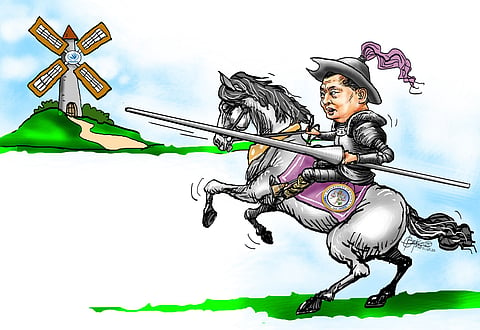
- NEWS
- the EDIT
- COMMENTARY
- BUSINESS
- LIFE
- SHOW
- ACTION
- GLOBAL GOALS
- SNAPS
- DYARYO TIRADA
- MORE

The Philippines could not have sent a more able champion than Justice Secretary Crispin "Boying" Remulla in arguing before the United Nations Human Rights Council that extra-judicial killing has not been a state policy in the country and that it will never be the case.
In appearing before the UNHRC, Remulla was persuasive and firm in putting forth the facts against the bewildering unfounded accusations that had been made by mere "parachute" observers who, for decades, have been coming to the country with pre-conceived notions and an agenda to smear.
Remulla's discussion made it very clear by inference that as a country with a fully functioning justice system, there's absolutely no justification for any UN rapporteur to come into the country to start any investigation on the about 6,000 deaths related to the past dispensation's campaign against illegal drugs.
"Extrajudicial killing is not state policy. Classifying a death that occurred during an anti-illegal drug operation as extra-judicial killing by default runs counter to the tenets of due process and the rule of law." Remulla told the UNHRC, stressing that the country will never tolerate the abuse of power and use of force beyond the bounds of the law.
"Let me say this in no uncertain terms: There is no state policy to attack, harass or intimidate human rights defenders, including environmental rights defenders, lawyers and other practitioners of the legal profession, and the media," he told the UN body.
The stance, according to Remulla, applies to everyone, including to the so-called enemies of the state, the communists who, he warned, had been engaged in subterfuge, deceit, and propaganda to shore up their diminishing number as a spent force reeling from surrenderers and battlefield losses.
The justice chief urged members of the UNHRC to exercise due diligence in validating first the human rights violations allegedly committed by government forces from various, we dare add, "polluted" sources.
In trying to keep alive a discredited ideology in the last five decades or so, the Reds, according to Remulla, have deliberately "blurred the lines between civic activism and armed violence."
Receiving the UNHRC's working group recommendations on the Universal Periodic Review or UPR of the Philippines this week, Remulla thanked the body for its largely positive peer review.
He said the government is encouraged by the acknowledgment of the different states of the significant strides and best practices in upholding the rights of children, migrant workers, refugees, persons in vulnerable situations, people at risk, fighting human trafficking, enhancing democratic institutions, and expanding civic space.
It is, however, against this backdrop that the Philippines is confronting an armed conflict that has been curtailing the right of the Filipino people to development, Remulla said, citing the unimaginable suffering of many families in the countryside and those whose children had been fooled by glib-tongued communist recruiters to take up arms for a largely discredited organization.
"They use human rights as a tool to advance their violent agenda, claiming red-tagging and reprisal when the State exercises its duty to protect the human rights to life, liberty, security of persons, and property; and to preserve national security and safeguard the democratic order," Remulla said.
Nonetheless, the country, according to Remulla, is not tarrying as it is determined to continue addressing the root causes of the strife through good governance, rule of law, and social justice with an emphasis on uplifting human dignity and the quest for lasting peace.
"We will continue to cooperate with civil society, and together bring about the peace and progress that the Filipino people richly deserve," he said in recognizing the UPR as a mechanism of the UN in bringing together various forces within a country to address human rights concerns.
Concluding his discussion, Remulla underscored the vibrancy of democracy in the Philippines where freedom of expression, including the right to air dissenting opinions, and the right to peaceful assembly is protected.
